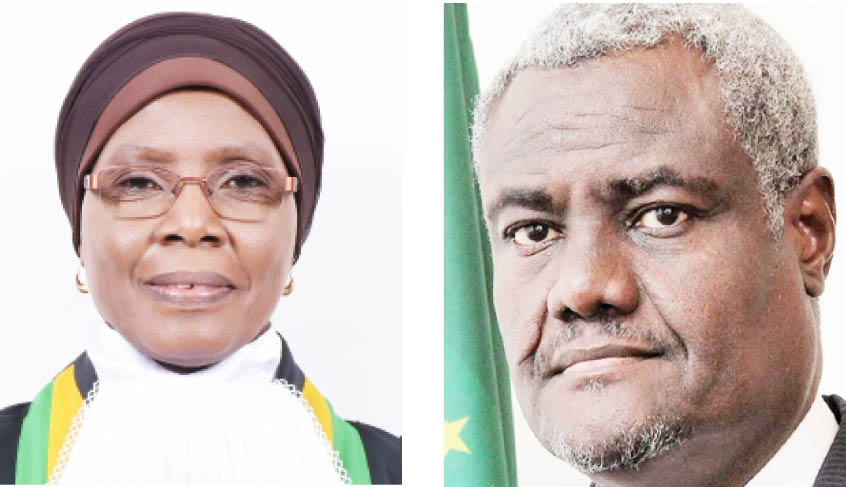Call for institutional overhaul of Union
Reforms needed in the application and enforcement of human rights in Africa depend on the African Union’s reforms, President of the African Court on Human and People’s Rights, Lady Justice Imani Daud Aboud, has said.
In her New Year message, Lady Imani Aboud (Tanzania) observed that member states have a greater role to play towards the enforcement of human rights on the continent, noting that the African Union, led by Moussa Faki Mahamat, can ensure that member states respect the objectives of the African Charter and implementation of the decisions.
Mahamat recently condemned the killings and human rights violations in Nigeria’s North West by bandits.
Aboud said, “engagement with various stakeholders last year has reinforced our resolution that self-made reform is the way to go if we are to preserve the fundamentals of the African human rights justice system.
“This said, it is beyond dispute that meaningful reform of the court cannot be achieved without the overall institutional overhaul of the African Union as the intergovernmental umbrella organisation.
“This speaks to a critical ingredient in framing the justice discourse during the year 2022. Bring states back at the heart of human rights justice in Africa.
“In this respect, I would like to seize this opportunity to commend the African Union and member states for the unwavering commitment expressed in the year 2021 to engage in a constructive dialogue with the court to conduct a review of their role in promoting human rights justice in Africa.”
She added that the protection of human rights in Africa cannot be fully realised without the active participation of African citizens and the support of non-governmental actors, on whose behalf the court was established.
Despite the African Union’s status as a signatory to all international human rights instruments and the adoption of the African Charter on Human and People’s Rights on June 1, 1981, the application and enforcement of human rights in Africa has remained very low.
The preamble of the Protocol to the African Charter on Human and Peoples’ Rights on the Establishment of an African Court on Human and Peoples’ Rights on June 9, 1998 states thus:
“The member states of the Organisation of African Unity hereinafter referred to as the OAU, states parties to the African Court on Human and Peoples’ Rights.
“Considering that the Charter of the Organisation of African Unity recognises that freedom, equality, justice, peace and dignity are essential objectives for the achievement of the legitimate aspirations of the African peoples.
“Noting that the African Charter on Human and Peoples’ Rights reaffirms adherence to the principles of Human and Peoples’ freedoms and duties contained in the declarations, conventions and other instruments adopted by the Organisation of African Unity, and other international organisations.
“Recognising that the twofold objective of the African Commission on Human and Peoples’ Rights is to ensure on the one hand promotion and on the other protection of Human and Peoples’ Rights, freedoms and duties.”
The African Court on Human and Peoples’ Rights in Arusha, Tanzania, which has been at the forefront of the enforcement of human rights of member states on the continent has regularly complained about the lack of implementation of its decisions by the authorities in member states, political interference, lack of public confidence in the court and respect for human rights.
There have been suggestions of using a suspension, diplomatic or economic sanctions to ensure compliance with judicial decisions on the continent even though only 31 of the 54 member states have ratified the declaration of the protocol.
Also, only eight of the member states have deposited their instruments of declaration before the court under Article 34(6), which permits private and public entities in the state with the competence to bring applications before the court.
Meanwhile, the African Court, between December and January, delivered 14 judgments on fundamental human rights from different member states.
In a judgement on January 10 in the application between Gozbert Henerico vs United Republic of Tanzania, the court rejected Henerico’s plea for pecuniary reparations as damages for material prejudice he suffered but awarded 5 million Tanzanian Shillings to be paid within six months as fair compensation.
Lady Justice Stella Anukam (Nigeria), who read the decision of the panel, held that “On non-pecuniary reparations, the court urges the respondent state (Tanzania) to take all necessary measures, through its internal processes and within one year of the notification of this judgement, to reopen and finalise the criminal proceedings relating to the applicant through a procedure that does not allow the mandatory imposition of the death sentence and upholds the full discretion of the judicial officer.”
Henerico, who was sentenced to death for murder and was awaiting execution, applied to the African Court under articles 7, 4, and 5, which border on the right to a fair trial, life and dignity.

 Join Daily Trust WhatsApp Community For Quick Access To News and Happenings Around You.
Join Daily Trust WhatsApp Community For Quick Access To News and Happenings Around You.


